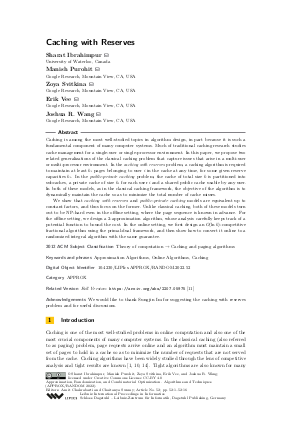Caching with Reserves
Authors Sharat Ibrahimpur, Manish Purohit, Zoya Svitkina, Erik Vee, Joshua R. Wang
-
Part of:
Volume:
Approximation, Randomization, and Combinatorial Optimization. Algorithms and Techniques (APPROX/RANDOM 2022)
Part of: Series: Leibniz International Proceedings in Informatics (LIPIcs)
Part of: Conference: International Conference on Randomization and Computation (RANDOM)
Part of: Conference: International Conference on Approximation Algorithms for Combinatorial Optimization Problems (APPROX) - License:
 Creative Commons Attribution 4.0 International license
Creative Commons Attribution 4.0 International license
- Publication Date: 2022-09-15
File

PDF
LIPIcs.APPROX-RANDOM.2022.52.pdf
- Filesize: 0.7 MB
- 16 pages
Document Identifiers
Related Versions
- Full Version https://arxiv.org/abs/2207.05975
Subject Classification
ACM Subject Classification
- Theory of computation → Caching and paging algorithms
Keywords
- Approximation Algorithms
- Online Algorithms
- Caching
Metrics
- Access Statistics
-
Total Accesses (updated on a weekly basis)
0Document
0Metadata
Abstract
Caching is among the most well-studied topics in algorithm design, in part because it is such a fundamental component of many computer systems. Much of traditional caching research studies cache management for a single-user or single-processor environment. In this paper, we propose two related generalizations of the classical caching problem that capture issues that arise in a multi-user or multi-processor environment. In the caching with reserves problem, a caching algorithm is required to maintain at least k_i pages belonging to user i in the cache at any time, for some given reserve capacities k_i. In the public-private caching problem, the cache of total size k is partitioned into subcaches, a private cache of size k_i for each user i and a shared public cache usable by any user. In both of these models, as in the classical caching framework, the objective of the algorithm is to dynamically maintain the cache so as to minimize the total number of cache misses. We show that caching with reserves and public-private caching models are equivalent up to constant factors, and thus focus on the former. Unlike classical caching, both of these models turn out to be NP-hard even in the offline setting, where the page sequence is known in advance. For the offline setting, we design a 2-approximation algorithm, whose analysis carefully keeps track of a potential function to bound the cost. In the online setting, we first design an O(ln k)-competitive fractional algorithm using the primal-dual framework, and then show how to convert it online to a randomized integral algorithm with the same guarantee.
Cite As Get BibTex
Sharat Ibrahimpur, Manish Purohit, Zoya Svitkina, Erik Vee, and Joshua R. Wang. Caching with Reserves. In Approximation, Randomization, and Combinatorial Optimization. Algorithms and Techniques (APPROX/RANDOM 2022). Leibniz International Proceedings in Informatics (LIPIcs), Volume 245, pp. 52:1-52:16, Schloss Dagstuhl – Leibniz-Zentrum für Informatik (2022)
https://doi.org/10.4230/LIPIcs.APPROX/RANDOM.2022.52
BibTex
@InProceedings{ibrahimpur_et_al:LIPIcs.APPROX/RANDOM.2022.52,
author = {Ibrahimpur, Sharat and Purohit, Manish and Svitkina, Zoya and Vee, Erik and Wang, Joshua R.},
title = {{Caching with Reserves}},
booktitle = {Approximation, Randomization, and Combinatorial Optimization. Algorithms and Techniques (APPROX/RANDOM 2022)},
pages = {52:1--52:16},
series = {Leibniz International Proceedings in Informatics (LIPIcs)},
ISBN = {978-3-95977-249-5},
ISSN = {1868-8969},
year = {2022},
volume = {245},
editor = {Chakrabarti, Amit and Swamy, Chaitanya},
publisher = {Schloss Dagstuhl -- Leibniz-Zentrum f{\"u}r Informatik},
address = {Dagstuhl, Germany},
URL = {https://drops.dagstuhl.de/entities/document/10.4230/LIPIcs.APPROX/RANDOM.2022.52},
URN = {urn:nbn:de:0030-drops-171741},
doi = {10.4230/LIPIcs.APPROX/RANDOM.2022.52},
annote = {Keywords: Approximation Algorithms, Online Algorithms, Caching}
}
Author Details
Acknowledgements
We would like to thank Sungjin Im for suggesting the caching with reserves problem and for useful discussions.
References
-
Dimitris Achlioptas, Marek Chrobak, and John Noga. Competitive analysis of randomized paging algorithms. TCS, 234(1-2):203-218, 2000.

-
Anna Adamaszek, Artur Czumaj, Matthias Englert, and Harald Räcke. An O(log k)-competitive algorithm for generalized caching. In SODA, pages 1681-1689, 2012.

-
Nikhil Bansal, Niv Buchbinder, and Joseph Naor. Towards the randomized k-server conjecture: A primal-dual approach. In SODA, pages 40-55, 2010.

-
Nikhil Bansal, Niv Buchbinder, and Joseph Naor. A primal-dual randomized algorithm for weighted paging. Journal of the ACM (JACM), 59(4):1-24, 2012.

-
Nikhil Bansal, Niv Buchbinder, and Joseph Naor. Randomized competitive algorithms for generalized caching. SICOMP, 41(2):391-414, 2012.

-
Nikhil Bansal, Christian Coester, Ravi Kumar, Manish Purohit, and Erik Vee. Learning-augmented weighted paging. In Proceedings of the 2022 Annual ACM-SIAM Symposium on Discrete Algorithms (SODA), pages 67-89. SIAM, 2022.

- Sorav Bansal and Dharmendra S. Modha. CAR: Clock with adaptive replacement. In 3rd USENIX Conference on File and Storage Technologies (FAST 04), San Francisco, CA, March 2004. USENIX Association. URL: https://www.usenix.org/conference/fast-04/car-clock-adaptive-replacement.
-
L. Belady. A study of replacement algorithms for a virtual-storage computer. IBM Systems Journal, 5(2):78-101, 1966.

-
Leah Epstein, Csanád Imreh, Asaf Levin, and Judit Nagy-György. Online file caching with rejection penalties. Algorithmica, 71(2):279-306, 2015.

-
Amos Fiat, Richard M Karp, Michael Luby, Lyle A McGeoch, Daniel D Sleator, and Neal E Young. Competitive paging algorithms. J. Algorithms, 12(4):685-699, 1991.

- Sharat Ibrahimpur, Manish Purohit, Zoya Svitkina, Erik Vee, and Joshua Wang. Caching with reserves, 2022. URL: http://arxiv.org/abs/2207.05975.
- Wu Kan, Tu Kaiwei, Patel Yuvraj, Sen Rathijit, Park Kwanghyun, Arpaci-Dusseau Andrea, and Remzi Arpaci-Dusseau. NyxCache: Flexible and efficient multi-tenant persistent memory caching. In 20th USENIX Conference on File and Storage Technologies (FAST 22), pages 1-16, Santa Clara, CA, February 2022. USENIX Association. URL: https://www.usenix.org/conference/fast22/presentation/wu.
-
Mayuresh Kunjir, Brandon Fain, Kamesh Munagala, and Shivnath Babu. Robus: fair cache allocation for data-parallel workloads. In Proceedings of the 2017 ACM International Conference on Management of Data, pages 219-234, 2017.

-
Lyle A McGeoch and Daniel D Sleator. A strongly competitive randomized paging algorithm. Algorithmica, 6(1-6):816-825, 1991.

-
Nimrod Megiddo and Dharmendra S Modha. ARC: A Self-Tuning, low overhead replacement cache. In 2nd USENIX Conference on File and Storage Technologies (FAST 03), 2003.

-
Qifan Pu, Haoyuan Li, Matei Zaharia, Ali Ghodsi, and Ion Stoica. FairRide:Near-Optimal, fair cache sharing. In 13th USENIX Symposium on Networked Systems Design and Implementation (NSDI 16), pages 393-406, 2016.

-
Yinghao Yu, Wei Wang, Jun Zhang, and Khaled Ben Letaief. Lacs: Load-aware cache sharing with isolation guarantee. In 2019 IEEE 39th International Conference on Distributed Computing Systems (ICDCS), pages 207-217. IEEE, 2019.

